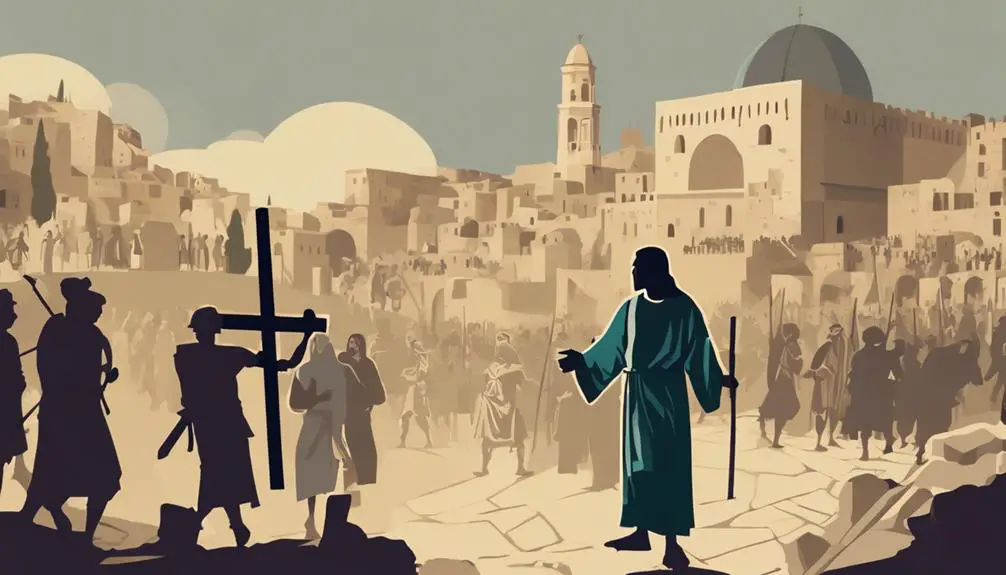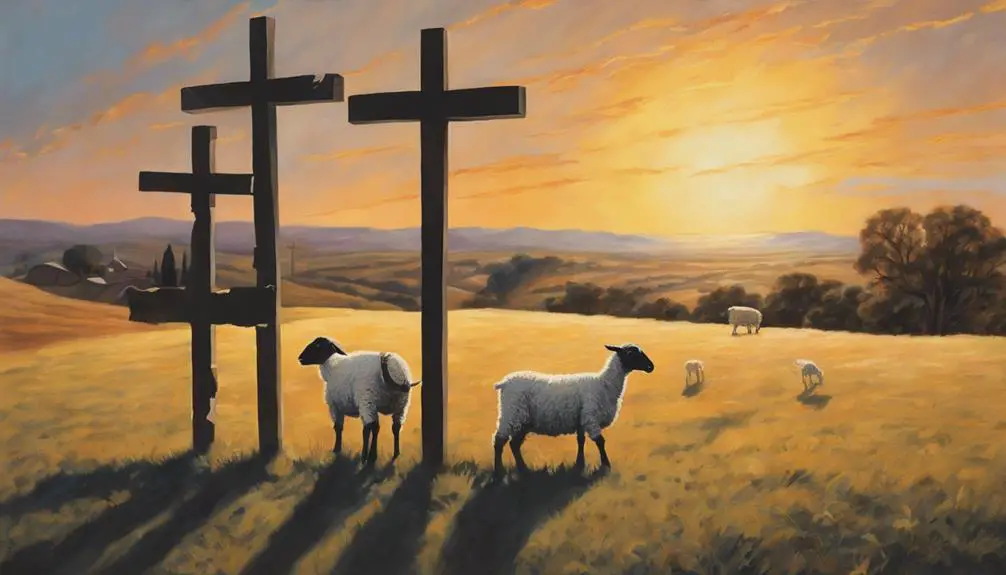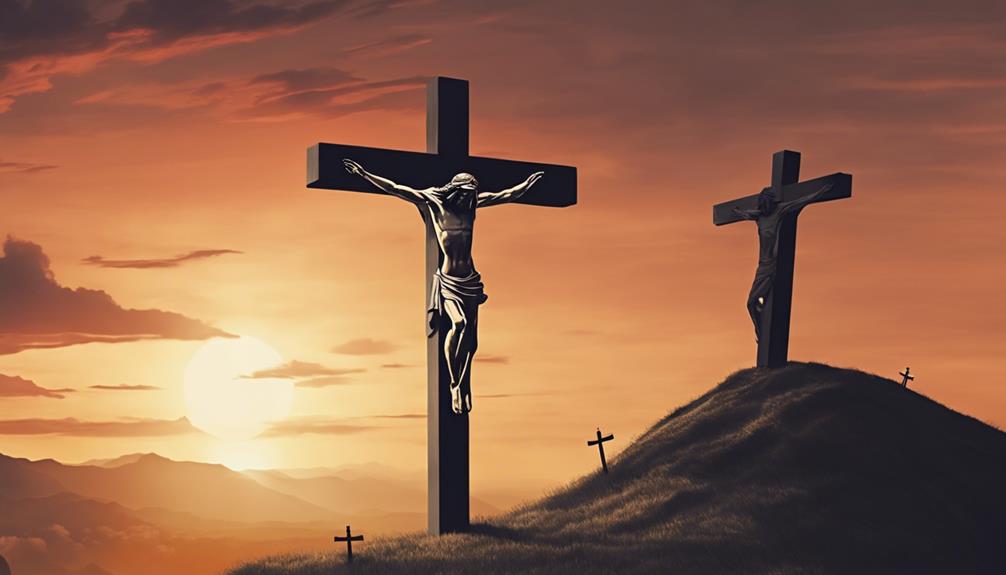Learn how the Bible verse 'It is finished' (John 19:30) takes on profound significance during Good Friday's solemn commemoration.

A Bible Verse About Good Friday
Remember when Christ said, 'It is finished' (John 19:30)? That's a line from the Bible that resonates deeply on Good Friday. You might ask, why this verse? How does it pertain to the crux of Good Friday?
Well, it's not just about Jesus' crucifixion, but it also symbolizes the completion of God's grand redemption plan. But there's more to this verse that meets the eye. Let's unpack its profound meaning together, and you might find it changes your understanding of Good Friday completely.
Key Takeaways
- Mark 15:34, symbolizing Jesus' despair and sacrifice, significantly resonates with Good Friday's themes of atonement and redemption.
- The verse offers deep theological insights into God's plan, human sin, and Jesus' role as the Messiah.
- Within its historical context, Mark 15:34 represents Jesus' experience of suffering and isolation under Roman rule.
- Personal reflection on this verse can lead to transformative growth, providing hope and strength amidst despair.
Unveiling the Chosen Verse

While delving into the profound depths of the Good Friday Bible verse, you'll discover its rich spiritual implications and the nuanced historical context that surrounds it. The chosen verse, found in Mark 15:34, reads: 'And at the ninth hour, Jesus cried out with a loud voice, saying, 'Eloi, Eloi, lema sabachthani?' which is translated, 'My God, My God, why have you forsaken me?''
Analyzing this verse, you'd notice its dual nature. It's an echo of human despair and a testament to divine sacrifice. Jesus, in his moment of extreme human pain, felt abandoned. Yet, his words are a direct quotation from Psalm 22, a prophetic text foretelling the Messiah's sufferings. This linkage not only reaffirms Jesus' identity as the Messiah but also shows his deep-rooted faith in his Father's plan.
Interpreting this verse, you'd find a profound teaching on the mystery of incarnation: Jesus, both God and man, fully embraced the human condition—including its sufferings. So, while Good Friday seems tragic, it's a pivotal part of a divine scheme, underpinning the hope of Easter Sunday.
Historical Context of the Verse

To fully grasp the significance of Mark 15:34, it's crucial that you delve into the historical context that surrounds its utterance. The verse is embedded in the Passion narrative, recounting Jesus' crucifixion on what's now commemorated as Good Friday. This historical event took place in the 1st-century Roman province of Judaea, where public executions were commonplace and crucifixions were the penalty for the most heinous crimes.
Understanding the sociopolitical environment of the time is vital. The Jewish people were under Roman rule, and their longing for a Messiah—a deliverer from oppression—was intense. When Jesus emerged, claiming to be that Messiah, it upset both the Jewish and Roman authorities. His crucifixion was a result of this perceived threat.
In Mark 15:34, Jesus, hanging on the cross, cries out in Aramaic, 'Eloi, Eloi, Lama Sabachthani?' which means, 'My God, My God, why have You forsaken Me?' This utterance, in its historical context, reflects Jesus' profound suffering and isolation, a crucial point to remember as we move forward in our exploration.
Theological Significance Explored

Having examined the historical backdrop of Jesus' crucifixion, let's now unearth the deep theological implications of Jesus' words in Mark 15:34. This verse isn't just a lament, it's a profound theological declaration. When Jesus cried out, 'My God, my God, why have you forsaken me?' He was expressing the depths of His physical, emotional, and spiritual suffering.
You should note that the significance of this verse reaches beyond the scope of Jesus' personal pain, suffering, and abandonment. Theologically, it signals the moment where sin was laid on Jesus, and He bore the weight of mankind's transgressions. It's a powerful representation of the doctrine of substitutionary atonement, suggesting that Jesus took on the sins of the world, hence, enduring separation from God.
Furthermore, the verse highlights Jesus' profound identification with humanity in its suffering. He experienced the ultimate form of isolation – abandonment by God, hence, making Him a compassionate high priest able to empathize with human suffering. This verse, therefore, carries significant theological weight, revealing deep truths about the nature of God, sin, and redemption.
Good Friday: Connection to the Verse

On Good Friday, the relevance of Mark 15:34 becomes particularly poignant, as it encapsulates the profound sacrifice Jesus made for humanity and the transformative power of atonement. This verse, where Jesus cried out, 'My God, my God, why have you forsaken me?' resonates with the deep anguish Jesus felt as he bore the sins of the world. It's a stark reminder of the heavy cost he paid for our redemption.
Understanding this verse deepens your appreciation of Good Friday. The intense suffering Jesus underwent wasn't just physical, but emotional and spiritual as well. He felt utterly abandoned, a depth of despair that mirrors the isolation sin can create in our lives.
On Good Friday, we remember this divine sacrifice and the subsequent resurrection, which is the foundation of Christian faith. The connection between this verse and Good Friday is crucial, as it underscores the enormity of Jesus' sacrifice and the profound love that underpins it. The impact of this verse is amplified on Good Friday, a day of reflection and gratitude for the selfless act that forever altered the course of humanity.
Personal Reflections and Applications

Often, personal reflections on Mark 15:34 can lead you to deeper insights about your own experiences with despair, isolation, and ultimately, redemption. You may find yourself recalling moments when you felt abandoned or desolate, mirroring Christ's cry on the cross. By examining these instances, you're likely to unveil patterns, perhaps even unacknowledged sources of pain, that may have driven your actions or reactions.
Delving deeper, you might also identify times when, despite feeling forsaken, you discovered an unexpected source of strength or hope. This mirrors Christ's journey from despair to resurrection, a critical element of the Good Friday narrative. It's a potent reminder that even in the deepest anguish, redemption is possible.
Applying these reflections to your life can be transformative. It may prompt you to further seek out and confront sources of despair, and to recognize and nurture your own capacity for resilience and redemption. The verse's message isn't just historical; it's deeply personal. It suggests that, like Christ, you too have the capacity to rise from despair, to find redemption in the most unlikely of places, and ultimately, to transform your suffering into a source of strength.
Conclusion
In closing, you've delved into the depth of a pivotal Bible verse and its profound significance on Good Friday.
You've navigated its historical context, theological importance, and personal implications.
Embrace this knowledge not just as an intellectual exercise, but as a catalyst for spiritual growth.
Let it shape your understanding and guide your actions – not just on Good Friday – but every day, as you strive to live a life in alignment with these sacred teachings.



Sign up